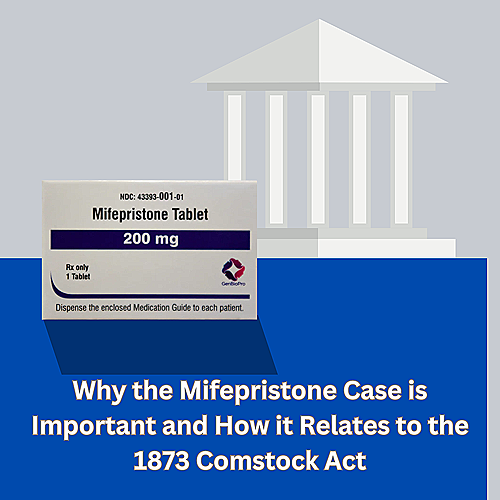Why the Mifepristone Case is Important, and How it Relates to the 1873 Comstock Act
Written by Nadia Krill
On Tuesday, March 26, the Supreme Court of the United States (SCOTUS) held oral arguments for the court case Alliance for Hippocratic Medicine v. FDA better known as the Mifepristone case. Mifepristone is the first pill of a two-pill regimen used to have a medication abortion. Medication abortions are responsible for almost two thirds of all abortions in the United States. After the overturning of Roe v. Wade in 2022, the access to abortion nationally has been reduced significantly. However, medication abortions remain an available option for people who cannot access a traditional abortion.
The Alliance for Hippocratic Medicine is defending anti-abortion medical groups and doctors who claim that medication abortions are unsafe, even though there is ample evidence that explains that they are in fact safe. The drug was first approved for use in the United States by the Food and Drug Administration (FDA) on September 28, 2000. The pill could only be distributed by a licensed physician and could only be taken up through the seventh week of pregnancy. However, in 2016, the FDA approved the drug to be taken up to ten weeks of pregnancy, which doubled the number of abortions eligible for the use of mifepristone. The FDA also changed the requirement for a licensed physician to administer the drug, to allowing women to take it at home, which made it more accessible for women across the U.S.
The Mifepristone case originated through a lawsuit out of the Fifth Circuit Court of Appeals in November 2022. The group of anti-abortion doctors sought to invalidate the 2016 FDA approval. If invalidated, it would reverse the timeframe to use the drug back to seven weeks and would require it to be prescribed and dispensed by a specially certified doctor. Addition to reverting to the previous requirements, patients would have to visit the doctor three times during the medication abortion process. As a result, women would not be able to use telemedicine, online appointments, to receive the medication needed. The extra steps would make the period to act so slim that by the time a patient is able to make the appointments, they would no longer be in the legal time frame of seven weeks to have a medication abortion. This is especially true since most women find out that they are pregnant at the four-week mark, meaning that they would have three weeks to go through an arduous process for a medication abortion. The 2022 lawsuit concluded with U.S. District Judge Matthew Kacsmaryk agreeing to suspend the FDA approval of mifepristone. In December 2023, The Supreme Court agreed to review the Fifth Circuit’s ruling and prevented Judge Kacsmaryk’s ruling from taking effect until they release a decision.
Alliance for Hippocratic Medicine v. FDA’s Supreme Court oral argument was revealing in a few ways. The focus of the argument seemed to be on whether the Alliance for Hippocratic Medicine had any standing. For a plaintiff to have standing, they would need to prove that they were injured by the regulation. In this case, the Justices seemed unconvinced that the Alliance for Hippocratic Medicine was injured by the FDA approval of mifepristone. If the Justices decide that the case has no standing, then it will be dismissed, and the lawsuit will be over.
The oral arguments also brought up the topic of the Comstock Act. It is a 151-year-old law that prevents people from sending “obscene” materials through the mail, including common mail carriers like FedEx and UPS. The law makes it illegal to send materials for an abortion, devices or medication, through the mail. It also prevented the shipment of contraceptives (birth control). In 1971, Congress removed the language from the law that talks about contraceptives but left the anti-abortion provisions. After the SCOTUS decision which legalized abortion, Roe v. Wade in 1973, the law became dormant. Since the court overturned Roe v. Wade in 2022, the Comstock Act is now once again enforceable.
During oral arguments, the conservative Justices Clarence Thomas and Sam Alito asked multiple times about the Comstock Act, and why the FDA does not use it to regulate mifepristone. By asking these questions, this argument affirms the idea that the government can use the Comstock Act to limit the distribution of medication and other devices used for abortions. Currently, it would be exceedingly difficult to pass a nationwide abortion ban through Congress because it would not have the number of votes that would be necessary to do so. However, that does not stop a conservative administration from enforcing the Comstock Act and essentially banning access to safe abortions nationwide without congressional approval. This would not only impact conservative states with abortion bans but liberal states as well.
The Supreme Court is expected to release their decision on the case by the end of June. Even though access to medication abortions seems to be protected for now, it does not take away from the fact that there could potentially still be a nationwide ban in the near future. The 2024 presidential election may determine the next four years of women’s bodily autonomy in the United States. It is important to understand the future implications of the Mifepristone case, and how it could shape access to a vital component of women’s healthcare.
Featured Image: Nadia Krill




